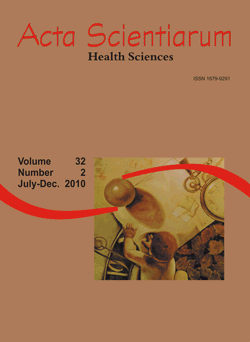<b>Infecções oportunistas em indivíduos com infecção pelo HIV e relação com uso de terapia antirretroviral</b> - doi: 10.4025/actascihealthsci.v32i2.4508
Resumo
O uso da terapia antirretroviral e a generalização das profilaxias primária e secundária levaram à redução do número de infecções oportunistas. É fato estabelecido a relação entre a não-adesão ao tratamento antirretroviral e o desenvolvimento de resistência do vírus HIV. Este trabalho avaliou a ocorrência de infecções oportunistas em pacientes HIV, relacionado-as ao uso regular/irregular de terapia antirretroviral. Foram realizadas avaliação clínica e consulta a prontuários e laudos de exames para identificação de infecções oportunistas e foi aplicado um questionário para se avaliar o uso de medicamentos antirretrovirais. Foram avaliados 144 pacientes, 131 apresentaram infecções oportunistas antes do início da terapia HAART e 74, mesmo após terapia HAART com um episódio de infecção oportunista em 44 (59,45%) pacientes em que 34 (45,95%) alegaram uso irregular dos antirretrovirais e dez (13,5%), uso regular. Dois episódios de infecções oportunistas em 26 (35,14%) pacientes, 21 (28,38%) com uso irregular de antirretrovirais e cinco (6,76%) com uso regular e três episódios de infecções oportunistas em quatro pacientes (5,41%), três (4,05%), com uso irregular da terapia e um (1,35%), com uso regular. Assim, como é observado nas demais regiões do Brasil, houve diminuição da incidência de infecções oportunistas com a utilização da terapia HAART. Por outro lado, continuam novos casos de infecções oportunistas, sugerindo que algumas pessoas têm esgotado todas as possibilidades quanto às terapias disponíveis.Downloads
DECLARAÇÃO DE ORIGINALIDADE E DIREITOS AUTORAIS
Declaro que o presente artigo é original, não tendo sido submetido à publicação em qualquer outro periódico nacional ou internacional, quer seja em parte ou em sua totalidade.
Os direitos autorais pertencem exclusivamente aos autores. Os direitos de licenciamento utilizados pelo periódico é a licença Creative Commons Attribution 4.0 (CC BY 4.0): são permitidos o acompartilhamento (cópia e distribuição do material em qualqer meio ou formato) e adaptação (remix, transformação e criação de material a partir do conteúdo assim licenciado para quaisquer fins, inclusive comerciais.
Recomenda-se a leitura desse link para maiores informações sobre o tema: fornecimento de créditos e referências de forma correta, entre outros detalhes cruciais para uso adequado do material licenciado.
























5.png)







